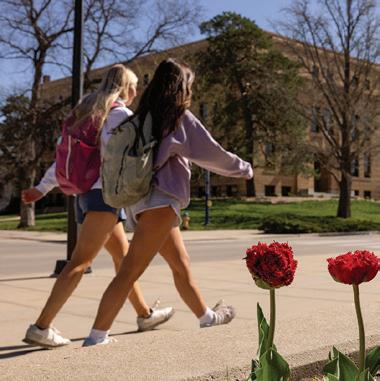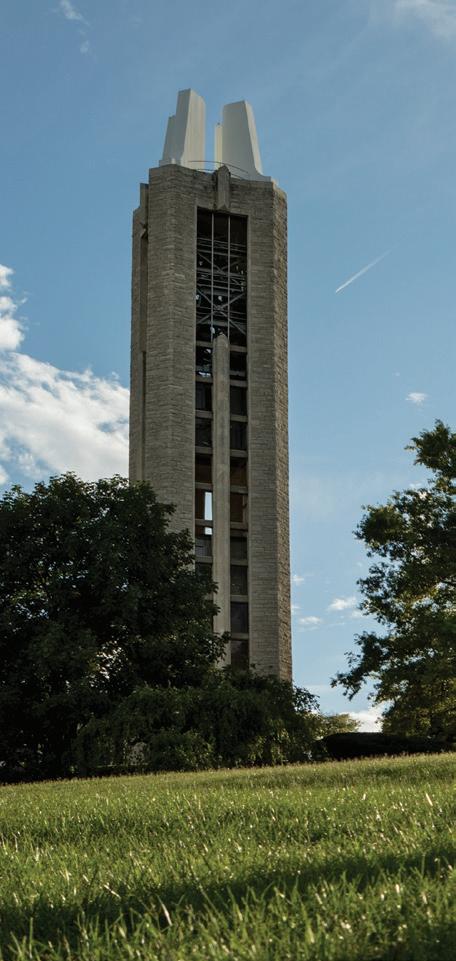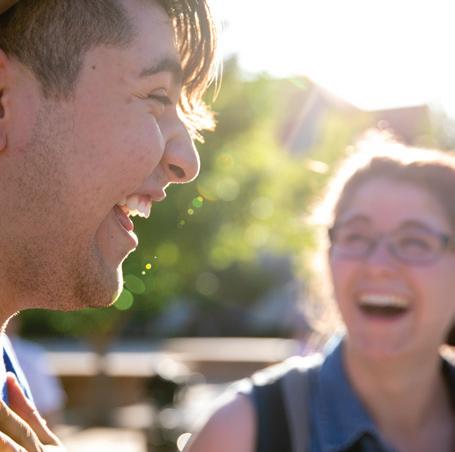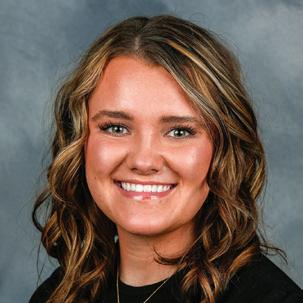WHAT WILL YOUR JAYHAWK STORY BE?
UNIVERSITY OF KANSAS SCHOOL OF EDUCATION & HUMAN SCIENCES
preparing educators and human science professionals as leaders since 1909

ACADEMIC YEAR 2025-2026

preparing educators and human science professionals as leaders since 1909

ACADEMIC YEAR 2025-2026
In the School of Education & Human Sciences, students like you make history. Make memories. Make discoveries. They make news and become educators or human science and sport professionals prepared as leaders to face and shape the world. Every KU student becomes a part of the Jayhawk family.
What will your story be?






The School of Education & Human Sciences at the University of Kansas ranks 8th among all U.S. public schools of education and human sciences 2025-2026 U.S. News & World Report’s Best Graduate Schools
$2M+ $75M scholarships awarded each year research expenditures each year
1
KU is the only Association of American Universities (AAU)-designated research institution in the state of Kansas


Of all undergraduate students within the KU School of Education & Human Sciences, 61% 16% 16% 55% are women are from historically are first-generation are Kansas residents underrepresented identities

HUNGRY ON CAMPUS? TRY THE CRUNCHY CHICKEN CHEDDAR WRAP. IT’S A KU DELICACY!



Founded in 1909, the University of Kansas School of Education & Human Sciences educates future teachers, administrators, counselors, psychologists, and health and sport professionals. We serve Kansas, the nation and the world by preparing leaders and practitioners in education and related human science fields. Students expand and deepen their understanding of education as a fundamental human endeavor, gaining the necessary skills and experience to help society define and respond to its educational responsibilities and challenges.
We offer a variety of undergraduate programs from our Lawrence Campus sites at Joseph R. Pearson Hall and Robinson Center. The School of Education & Human Sciences also offers several degree programs at the KU Edwards Campus in Overland Park, Kansas.
Creating a welcoming environment for all
We believe that creating a welcoming environment for all is vital to our success — specifically, our teaching, advising, mentoring, research and service functions. As members of the university and the larger community, we value intellectual variety and knowledge, which requires a respectful and caring culture.
Undergraduate degrees offered
• Bachelor’s degree programs in curriculum & teaching
• Bachelor’s degree programs in health, sport & exercise sciences

Explore our undergraduate degree programs: soehs.ku.edu/academics/undergraduate


Teacher education programs at the University of Kansas lay the groundwork for successful careers in educational settings.
Students can study abroad, take advantage of learning from prestigious faculty, and gain diverse experiences through their field experience in Lawrence and surrounding school districts. The four-year initial licensure programs cover a wide variety of age ranges and subject areas. Once they graduate from one of these teacher education programs, Jayhawks are prepared to pursue a teaching license in Kansas with support available for obtaining licensure in other states.
Elementary education and our two blended general education/special education programs (unified early childhood and elementary education unified) are each set up in a cadre model, which means that students complete a majority of their teacher preparation courses with a small group of 25 to 30 others.
Students in secondary teacher education gain expertise in their chosen teaching interests by focusing a large percentage of time in that specific content area, while elementary teacher education students cover a wide breadth of subjects.
2
semesters of practicum and student teaching offer valuable classroom experience
95% of Jayhawks who graduate from the School of Education & Human Sciences passed at least one licensure exam (academic year 2024-2025)
$61,023
average yearly contracted teaching salary in the state of Kansas 2024-2025 Kansas Department of Education
4 years to complete the teacher education program at KU when starting the program in your first college semester
< 50 miles to a valuable student teaching experience, all within a 50-mile radius of Lawrence

Field experience
KU students leave our initial teacher licensure programs with a clear understanding of the expectations of the teaching profession and with approximately 600-1,000 hours of field experience.
Licensure endorsements
The Department of Curriculum & Teaching also offers licensure endorsements in Special Education (provisional) and Teaching English to Speakers of Other Languages (TESOL).
Student teaching
Student teaching is a requirement for all of our initial teacher licensure programs. Students have the opportunity to teach in a variety of settings — urban, suburban or rural areas. Student teaching is completed within a 50-mile radius of the main campus in Lawrence, Kansas. Many of our teacher education programs include two semesters of practicum and student teaching, as well as multiple semesters of experience in education settings. STEMTeach KU, PE+, visual art education and music education include just one semester of student teaching. Students interested in visual art education or music education should contact the College of Liberal Arts & Sciences or the School of Music for more information.

Learn more about student teaching and other field experience opportunities at KU: soehs.ku.edu/student-life/field-experience

“I’ve truly loved being part of the elementary education program. The close-knit community and cadre-style approach have made it easy to build strong relationships with both my peers and professors. The faculty are incredibly supportive and bring real-world insight into every class, making learning meaningful and engaging.”
—Adriana
Nuzzo, elementary education
A bachelor’s degree in unified early childhood teacher education prepares you for work in inclusive settings to meet the learning needs of young children, ages birth through 3rd grade, including those at risk for and with developmental delays or disabilities. Students who complete this program are prepared to apply for a teaching license in general education and special education.
A bachelor’s degree in elementary teacher education prepares you to teach children in pre-K through 6th grade. This program combines general education courses and professional education coursework with multiple field experiences at the elementary level in diverse communities.
A bachelor’s degree in elementary education unified prepares you for work in inclusive settings to meet the learning needs of all children in kindergarten through 6th grade, including those with disabilities. Students who complete this program are prepared to apply for a teaching license in general education and special education.
The bachelor’s degree in secondary history, government & social studies teacher education prepares individuals to teach in both middle school and high school classrooms. The teacher education program combines history, political science and geography courses, as well as professional education coursework, with multiple field experiences in diverse communities.
The bachelor’s degree in secondary English teacher education prepares pre-service educators to teach adolescents in both middle school and high school classrooms. The program combines literature-based theory and knowledge with culturally diverse readings and discussions. In addition to the course offerings in the School of Education & Human Sciences, courses taught by faculty from the Department of English offer students learning options in rhetoric, linguistics and literature.
“As a secondary education major, I have found that all of my professors are very welcoming and student oriented, making it easy for me to get the most out of my time spent in class. I have also built lasting relationships with several of my professors and gone to them for advice and recommendations. What's great is that they are always eager and excited to help in whatever way they can.”
—Hudson Marmon, secondary history, government & social studies

Careers in science, technology, engineering and mathematics (STEM) all require creative thinking and leadership. STEMTeach KU is designed to fit the unique needs of STEM majors in a way that develops their ability to be leaders in their field and in the classroom. In this program, students can pursue a teaching license alongside earning a degree in one of several STEM fields. This program is offered in collaboration with the College of Liberal Arts & Sciences.
The bachelor’s degree in physical education plus (PE+), which is a concentration of the secondary education program at the University of Kansas, prepares individuals to become PE teachers at the pre-kindergarten through 12th grade levels. Students who graduate with a bachelor’s degree in PE+ will have fulfilled the requirements for the degree as well as the requirements to pursue an initial teaching license in physical education for pre-kindergarten through 12th grade in Kansas. The PE+ program also prepares graduates to pursue a licensure endorsement (by KSDE examination) in a variety of areas, such as secondary English or middle math — or earn a minor in business, sport management, or sport & exercise psychology.


“One of the best parts about STEMTeach KU is how fast you are placed into classrooms while also working with people in your major. It truly does feel like it’s a community.”
—Kaia Haigh, STEMTeach KU
“The PE+ program at KU has been the most fun and rewarding part of my college experience so far. I have gained valuable experience in teaching, created lifelong friendships and met future colleagues who I know will have bright futures.”
—Ashley Carlisle, physical education plus

JAMES NAISMITH, CREATOR OF BASKETBALL, WAS A PHYSICAL EDUCATION INSTRUCTOR AT KU

The academic programs offered through the Department of Health, Sport & Exercise Sciences (HSES) lay the groundwork for success in a variety of health, science and sport careers.
HSES students have access to study abroad programs, research with faculty, and volunteer opportunities in the immediate community and beyond. In addition to its academic programs, the department offers research opportunities for faculty and students in a variety of laboratories and clinics.
65 internship sites > 30
U.S. states in which Jayhawks with a degree in sport management are currently working in collegiate sport, professional sport, or general sport/education
42% of Jayhawks who graduate with a major in community health pursue graduate degrees
47% of Jayhawks who graduate with a major in exercise science pursue graduate degrees
6 national championships won by the KU men’s basketball team (four NCAA Division 1 championships, two Helms championships prior to the formation of NCAA)
“Being
a part of KU sport management is an experience like no other. Not only have I learned about the inner workings of the sporting industry from experts in the field, but I have had the chance to gain real-world professional experience through the many opportunities the program has provided.”

—Taylor Durst, sport management
The bachelor’s degree in sport management prepares students for a variety of sport-entertainment, business, education, coaching and performance positions in the sport and athletics industry: professional athletics, intercollegiate athletics, international sports, Olympic sports, athletic footwear and apparel, and youth and high school athletics, as well as other sport, recreation and health-related organizations. Students learn from full-time faculty who are prominent scholars and expert practitioners. Students also get to interact with program alumni and other sport professionals working for local sport organizations such as the Kansas City Chiefs, Sporting Kansas City, Kansas City Current, Kansas City Royals, Garmin, Kansas City Sports Commission and Kansas Athletics, as well as other leading national and global sports organizations and brands.
Hands-on learning and final internship
Volunteer and work experiences in the sports industry are continuously offered throughout a sport management student’s time in the program. A semester-long sports internship is required for sport management majors during the last semester of their program, providing real-world experience and the opportunity for seniors to grow their network of future employer contacts. All classes in the program must be completed before the final full-time sports internship.
Career directions
student-athlete development & leadership professional | marketing & fan experience director | business development manager | public relations & communications director | brand development & product designer | youth sports coordinator | social media & creative content management manager | name, image & likeness strategy director | community relations coordinator | facilities & events operations coordinator

“I have learned how to better serve underrepresented populations as well as engage with community partners who have taught me important skills for my future career. I have also gained relationships with other students and professors who support and inspire me daily.”
—Emily Sparke, community health
The bachelor’s degree in community health prepares students for career paths in a variety of public health, community-based and clinical settings. The program is rigorous and dynamic and allows students who are passionate about health issues in a community setting to work with individuals to develop healthy attitudes and behaviors. Students in this program acquire the knowledge and skills to engage with diverse communities in the development, implementation and assessment of health promotion programs. Ultimately, it is through this program that students get to tailor their unique experience to achieve their professional goals, as well as ignite social movement, make connections and work toward achieving positive health outcomes for our local communities.
Preparation for specialist exam
Coursework in our undergraduate program also prepares students for the Certified Health Education Specialist exam, a nationally recognized competency-based certification. Our program provides study materials to best situate students for success as they pursue this professional certification, making them more competitive candidates for future educational programs and/or job opportunities.
A semester-long internship, 560 hours or more, is required for community health majors during the last semester of their program. The senior internship provides real-world experience and future employer contacts. All classes in the program must be completed before the internship.
Career directions
hospital/clinic-based educator | health consultant | health education specialist | health program coordinator | corporate wellness professional | research coordinator | community outreach specialist | community health worker
The bachelor of science in exercise science and bachelor of applied science in exercise science degrees each provide a thorough understanding of the human body and will prepare you to work in health, medical or fitness-related professional fields. The program is a designated Education Recognition Program through the National Strength and Conditioning Association. Program coursework focuses on various studies — physiology of exercise, motor control, biomechanics and rehabilitative exercise.
Preparation for professional programs
Coursework in our bachelor of science program prepares students to meet prerequisite requirements for many professional school programs including medical school and the physical therapy program at the University of Kansas Medical Center. Those who choose to pursue an advanced degree after graduation are considered for many highly selective master’s and doctoral degree programs across the U.S.
Exercise science students choose either to complete an approved internship experience or pursue a program track full of approved elective courses which can be used as prerequisites for graduate programs. The semester-long internship, 600 hours or more, provides students with hands-on experience and is completed during the last semester of the program, once all classes in the program have been completed. Elective/minor options include business, healthcare management, nutrition, sport & exercise psychology, and more.
Career directions
exercise/fitness instructor | personal trainer | sport scientist | clinical exercise physiologist | injury prevention specialist | sport medicine specialist | strength and conditioning coach
“Through research opportunities, clinical observations, and collaboration with peers, I deepened my knowledge of how exercise impacts health and performance. The major prepared me with the skills and confidence needed for graduate school and a career in exercise-related fields.”

—Austin Oakerson, exercise science












may enhance or further specialize their major course of study with an undergraduate minor or certificate.
The minor in education studies provides a solid grasp of essential theory and research in education, along with an opportunity to focus on particular aspects of the process of the educational system. With choices from lower and upper division elective courses, the minor also provides undergraduate students of any major an opportunity to develop understanding of the legal, social, political and economic forces that influence and shape educational policies.
Designed for students interested in coaching as a career or a hobby, the minor in athletics coaching offers a core set of skills — including coaching team sports, individual and dual sports, methods of strength training and conditioning, and sport facilities and event management.
This minor provides students with a skill set in sport management, including literacy in sport marketing, sport finance, personnel management and the sociological aspects of sport. Students also have a wide variety of electives from which to choose, including sport facilities, sport in film, sport communication and experiential learning in sport.
This minor provides strong training for students moving directly into employment in sport, exercise and wellness settings after graduation, as well as a solid foundation for those pursuing graduate study in sport and exercise psychology. Students acquire content knowledge and the skills to apply theory to practice in sport and exercise settings. They learn to create optimal environments and deliver mental skills training to individuals of all ages and levels.
This undergraduate certificate imparts core skills in the name, image & likeness (NIL) field, easily the fastest-growing area for new positions in college athletics. This certificate is designed to serve students interested in working in the NIL space, as well as student-athletes at KU who are looking for training about how to manage their own name, image and likeness.
This undergraduate certificate prepares students to address community health problems and health-related issues from a holistic perspective. Students gain expertise in planning, implementing and evaluating health promotion programs across diverse settings. A curriculum focused on health education, behavioral theory, program planning and community engagement prepares students to modify individual, interpersonal, community and environmental factors that influence health behaviors.

This certificate offers students the opportunity to take a complementary selection of courses to prepare for careers in strength and conditioning, including personal training and tactical strength and conditioning. Several of the courses are coupled with respective certification exam eligibility as provided by the National Strength and Conditioning Association. Strength and conditioning professionals work with athletes at all levels, including individuals who may retain the desire to improve their strength, speed, agility and endurance. The certificate program emphasizes the physiological, biomechanical and metabolic demands of the related occupations as well as the organizational structure of facilities and management.
The KU School of Education & Human Sciences offers students, faculty and instructors access to a variety of campus-based labs, resources and technology services. As a student, you’ll have the opportunity to conduct research directly under the supervision of faculty members who are renowned scholars and established leaders in their fields of study. Here are just a few examples.
The social construction of thinking
There is an old saying that teachers don’t tell students what to think, but what to think about. A new study from Min-Young Kim, assistant professor of curriculum and teaching at KU, found that even beyond helping students understand how to think through complex topics, a classroom can work with a teacher to develop its own social construction of thinking.
Every baseball season, players from major leagues to youth levels lose time because of injuries to the ulnar collateral ligament in the elbow. Quincy Johnson, assistant professor of health, sport & exercise sciences, is co-author of a new study that used advanced technology to measure the thickness of baseball players’ UCLs, finding the ligaments were thicker in pitchers versus position players and that the common assumption of certain arm slots being less stressful on the elbow was not supported.
Many students have the academic abilities to study challenging science, technology, engineering and mathematics fields, but they do not feel like STEM is a place for all. The inclusion of arts, or STEAM, helped broaden the field. Now, a new book by curriculum & teaching scholars Douglas Huffman and Imogen Herrick, and Kelli Feldman, formerly of KU, reveal new ways to help all students feel like they belong in STEM.
Contact sports frequently see athletes go down with ACL injuries, but they most commonly do not result from direct contact to the knee. To better understand indirect contact knee injuries, a study led by Yu Song, assistant professor of health, sport & exercise sciences, has simulated pulling on an athlete’s jersey while jumping to determine which types of contact are most risky for such injuries, finding pulling from behind is the most dangerous and that upper body strength is more important in preventing injuries than perhaps thought.


For more information about labs and research within the School, visit hses.ku.edu/ mission-vision/ research-labs
The KU Office of Study Abroad & Global Engagement (SAGE) offers programs for students in every part of the world and in a wide variety of majors. SAGE works closely with KU’s academic departments to identify and evaluate study abroad options and courses so you will know how a recommended program fits with the degree requirements of your major.

Curious about your study or teach abroad options? Learn more at studyabroad.ku.edu/major

First-year undergraduate students may be directly admitted to their SOEHS major if they meet these assured admission standards:
• 3.25 GPA on a 4.0 scale, no test scores required or
• ACT score of at least 21 or SAT score of at least 1060, plus a GPA of at least 2.0
Current KU and transfer students may be admitted to their SOEHS major if they have a 2.75 KU plus transfer cumulative GPA

Read about admission requirements at soehs.ku.edu/admission
Since 1958, the School of Education & Human Sciences has offered financial support through academic scholarships to thousands of its students. School of Education & Human Sciences scholarships are awarded on a competitive basis, taking into account both need and merit. Priority for undergraduate scholarships will be given to college seniors.

For more about scholarships, visit soehs.ku.edu/admission/scholarships




Have questions? Ask us! soehs.ku.edu/current-students/ undergraduate-student-ambassadors
To schedule your visit, see admissions.ku.edu/visit
